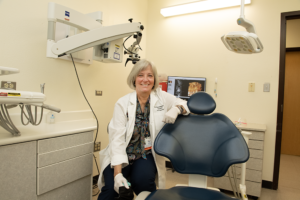TUBA CITY — “We are very fortunate that Dr. Cindy Rauschenberger, a board-certified endodontist, has recently joined our staff at Tuba City Regional Health Care Corporation,” said Dr. Christina Zeigler, Director of the TCRHCC Dental Department. “At TCRHCC, we now have ten general dentists, three pediatric dentists, and one endodontist on staff.
“I don’t know of any other Navajo area IHS clinic with an endodontist on staff,” said Dr. Zeigler. An endodontist is a dentist who completes at least two additional years of training focused solely on diagnosing tooth pain, treating the tooth’s interior, and performing the most challenging root canals. The goal of an endodontist is to save teeth.

To become a board-certified endodontist, Dr. Rauschenberger was required to defend her work in front of a panel of experienced colleagues and demonstrate a thorough mastery of the science of endodontics. Nationwide, there are about 220,000 dentists, about 6,000 endodontists, and approximately 1,380 endodontists who have successfully become board-certified, or less than 1% of all practicing dentists.
Dr. Rauschenberger joined the TCRHCC dental staff in April 2023 and is excited to be in Tuba City. Dr. Rauschenberger said, “My great, great grandfather was of Cherokee ancestry and was part of the Trail of Tears, so I’ve always wanted to practice in dental clinic on a reservation.”
Dr. Rauschenberger grew up in a small town in Northern Illinois, about 3 hours west of Chicago. After college graduation, she attended dental school at the University of Iowa and completed her endodontic training at Northwestern University in Chicago in 1989. She then joined the dental faculty at the University of Maryland in Baltimore, teaching endodontic theory and root canal therapy to undergraduate and graduate dental students.
After several years in the academic world, Dr. Rauschenberger and her family decided to return to the Midwest to be closer to family and to enter private practice. She founded her practice Fox Valley Endodontic Specialists, in her husband’s hometown of Elgin, Illinois. She remained in private practice for over 25 years as she and her husband raised their two children, Karl Rauschenberger (age 26) and Kacy Calderwood (30).
At the end of 2022, Dr. Rauschenberger started looking for a new challenge and an opportunity to slow down. She was intrigued by a friend and colleague practicing on the Apache Nation in Globe, Arizona, who shared her knowledge about opportunities to become an endodontist on a reservation. The rest is history.
“I am fortunate to work here,” said Dr. Rauschenberger. “I love being an endodontist, working with patients, and the challenge of saving teeth. The dental clinic at TCRHCC is well-run, and I have state-of-the-art equipment for patient care. “My position here at TCRHCC is half-time, so it allows me to continue to help patients and to start to slow down a little.” It also allows me and my husband to explore the Southwest.
Dr. Rauschenberger chose endodontics because: “In the field of dentistry, Endodontics deals with the biology of the tooth and healing of the bone, and I find the biology part of dentistry exciting and interesting,” she said.
Endodontists manage complicated root canal treatments, such as the root canals on all molar teeth, “But all the dentists here in the (TCRHCC) dental clinic can do root canals on front teeth and other uncomplicated root canal procedures,” she said.
Since joining the team, she has observed that she is providing root canals to patients on the reservation who are younger than in the other places she has worked. Her observation is supported by TCRHCC Community Assessments, and the IHS Data Brief published in November 2022 which was a follow-up report to the 2015 Oral Health of American Indian and Alaska Native Survey. “There are many reasons for this,” she said. “The main reasons may be the types of foods and drinks consumed on the reservation, a lack of understanding of oral biology including types of natural bacteria in the mouths of families and how to prevent their effects, and some genetic factors. Also, tooth clenching and grinding, systemic or chronic diseases such as diabetes, and other health factors make people more susceptible to cavities, root canals, and periodontal disease. Another observation is that the teeth of Native American patients are more likely than other populations to have complicated or unique root shapes and tooth anatomy. “These special shapes and root forms are inherited through their ancestors and their genes.”
For all these reasons, there are a significant number of patients on the reservation with molar teeth requiring complicated root canals. The patients presenting for dental care at TCRHCC now have a board-certified Endodontist to assist them in saving these teeth.
